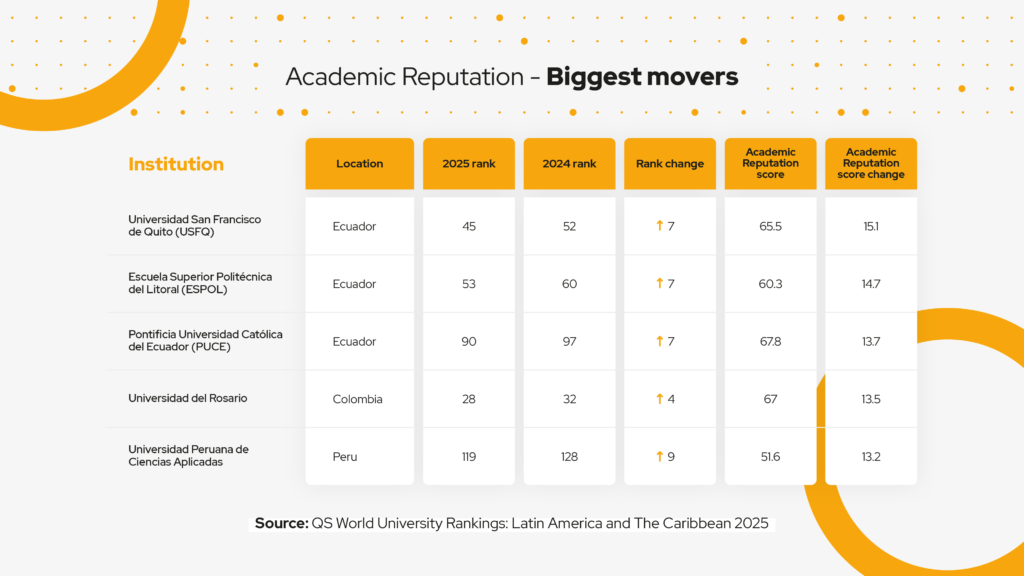
The QS World University Rankings: Latin America & The Caribbean 2025 are now live!
Universidade de São Paulo is crowned first for another year, with strong performance in metrics including Academic Reputation, International Research Network and Papers per Faculty. Additionally, Pontificia Universidad Católica de Chile (UC), Universidade Estadual de Campinas (Unicamp) and Tecnológico de Monterrey also maintained their spot in second, third and fourth place respectively.
Notably, Universidade Federal do Rio de Janeiro made the most significant improvement in the top 10, moving from eighth last year to fifth place overall, due to strong results in Employer Reputation, International Research Network and Staff with PhD.
This year features a total of 437 institutions ranked in the Latin America and the Caribbean regions.
The QS World University Rankings: Latin America and Caribbean 2025 methodology uses compiled factors from the QS World University Rankings, with the inclusion of additional metrics and adjusted weightings to address the region’s specific priorities and challenges. Unique metrics include:
Staff with PhD – This metric reflects the ongoing challenge of academic quality in the region. While a PhD isn’t a complete solution, it does indicate subject expertise and peer recognition.
Web Impact – This measures a university’s online presence, recognising that institutions in global rankings should have a strong digital footprint, often featuring English-language content to cater to international students, not just local ones.
Papers per Faculty and Citations per Paper – These variations of research analytics highlight the importance of research productivity in the region while acknowledging that global citations often favour English-language publications.
QS World University Rankings: Latin America & The Caribbean 2025 top 10
- Universidade de São Paulo, Brazil
- Pontificia Universidad Católica de Chile (UC), Chile
- Universidade Estadual de Campinas (Unicamp), Brazil
- Tecnológico de Monterrey, Mexico
- Universidade Federal do Rio de Janeiro, Brazil
- Universidad de Chile, Chile
- Universidad de los Andes, Colombia
- UNESP, Brazil
- Universidad Nacional Autónoma de México (UNAM), Mexico
- Universidad de Buenos Aires (UBA), Argentina
New entrants
14 institutions make their debut in the QS World University Rankings: Latin America & The Caribbean 2025. Guatemala’s Universidad Rafael Landívar (URL) ranked 171-180th is the strongest performing new entrant.
Argentina accounts for two new universities: Universidad Argentina John F. Kennedy (ranked 301-350) and Universidad Siglo 21 (ranked 401+). Paraguay, El Salvador, and Mexico also feature two new institutions each. Brazil, Chile, Guatemala, Puerto Rico, the Dominican Republic, and Ecuador each added one new institution to the table.
Notable improvements in performance metrics

Academic Reputation: Institutions have shown significant growth in this metric. This includes Ecuador’s Universidad San Francisco de Quito (USFQ), who also climbed seven places up from its previous overall rank of 52 to 45.
Citations per Paper: Brazil’s Universidade Paulista – UNIP improved its Citation’s per Paper rank by five places. However, Universidad San Ignacio de Loyola in Peru stood out as the biggest climber – moving up 23 places in the category.
Web impact: Another Brazilian institution, Uniersidade Federal de Goiás (ranked =139 overall), and demonstrated the strongest improvement in Web Impact, moving up 12 places. Mexico’s Universidad Veracruzana was the second highest improver, climbing up five places in this category.
Notable changes in the overall top 20
Institutions in Brazil saw the strongest improvements among all locations in the top 20 of the QS World University Rankings: Latin America & The Caribbean 2025.
Brazilian university UNESP improved from 10th to eighth in their overall rank. Thanks to its improvement in Academic Reputation, Employer Reputation, Citations per Paper, Papers per Faculty and Staff with PhD scores.
Universidade Federal do Rio Grande Do Sul improved their overall rank from 18th to 16th, due to their strong performance in the Academic Reputation, Employer Reputation and Citations per Paper indicator.
Universidade Federal de Minas Gerais advanced from 14th to 13th position overall, showing a rise in Academic Reputation, Employer Reputation, and Citations per Paper also.